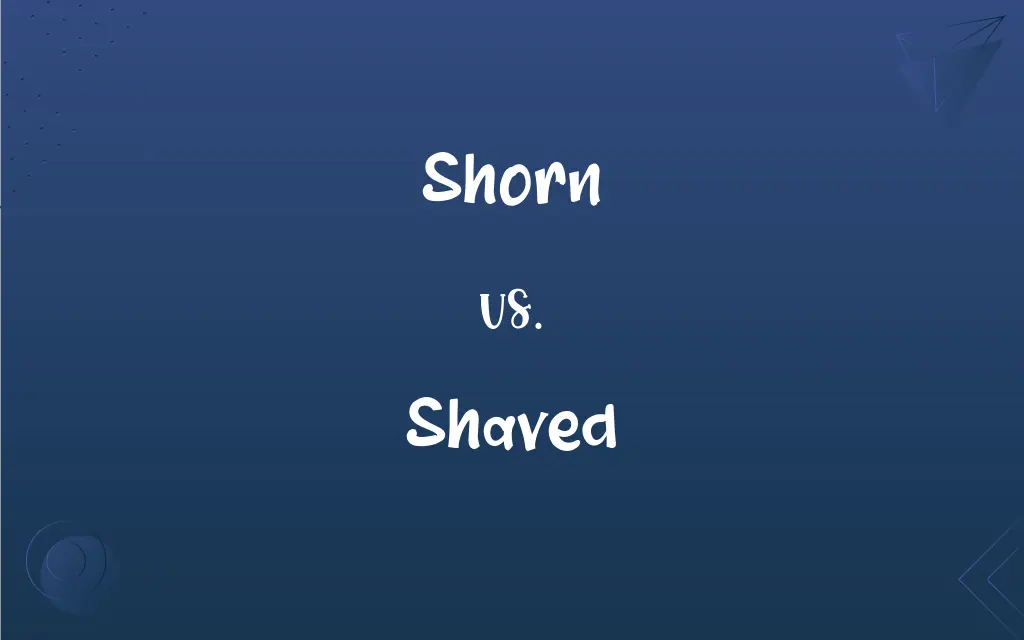Shorn vs. Shaved: What's the Difference?
Edited by Aimie Carlson || By Harlon Moss || Published on January 17, 2024
Shorn refers to having hair or wool cut off close to the skin, usually with scissors or shears, while shaved means to have hair removed entirely using a razor or similar tool.

Key Differences
Shorn typically involves cutting or clipping hair, wool, or fur close to the skin, often using tools like scissors or shears. It's a term frequently used in the context of sheep shearing. Shaved, however, implies the removal of hair by cutting it off right at the skin's surface, typically using a razor or a similar sharp instrument.
When something is shorn, a small length of the hair or fiber usually remains on the skin or body. In contrast, shaving generally results in a much smoother surface, with hair removed as close to the skin as possible without usually causing injury.
Shorn is often used in a broader, sometimes metaphorical sense, to indicate having been stripped or deprived of something. Shaved, on the other hand, is more specifically used to describe the act of hair removal and is rarely used metaphorically.
The process of being shorn can be less meticulous and precise compared to being shaved. Shaving often requires more care and precision, especially to avoid cuts or skin irritation.
In terms of appearance, being shorn leaves a more uniform and slightly rough texture, as seen in shorn sheep or cropped haircuts. Shaved surfaces, however, are characteristically smooth and bare, as seen with shaved faces or heads.
ADVERTISEMENT
Comparison Chart
Tool Used
Scissors, shears.
Razor, shaving blade.
Hair Length After
Short length remains.
Hair removed close to skin, very smooth.
Common Usage
Wool, fur, or hair.
Hair, especially facial or body hair.
Precision Required
Less meticulous.
Requires more care and precision.
Texture Resulting
Uniform, slightly rough.
Smooth, bare surface.
ADVERTISEMENT
Shorn and Shaved Definitions
Shorn
Having hair or fur trimmed down significantly.
He appeared with his head shorn, a stark contrast to his usual style.
Shaved
Having hair removed close to the skin with a razor.
He shaved his beard for the first time in years.
Shorn
Stripped of a covering or surface layer.
The trees were shorn of their leaves after the storm.
Shaved
Trimmed off hair or other growth very closely.
The barber shaved the nape of his neck with precision.
Shorn
Trimmed or cut back heavily.
The overgrown hedge was shorn to a neat size.
Shaved
Cut off hair, whiskers, etc., very closely to the skin.
The athlete shaved his head for the swimming competition.
Shorn
Cut off close to the skin, typically about hair or wool.
The sheep were shorn at the beginning of summer.
Shaved
Made smooth by removing hair with a blade.
Her legs were smoothly shaved for the photoshoot.
Shorn
Deprived or stripped of something.
The company was shorn of its assets in the merger.
Shaved
Removed hair entirely from a part of the body.
He shaved his face daily for a clean-shaven look.
Shorn
A past participle of shear.
Shaved
To remove the beard or other body hair from, with a razor or shaver
The barber lathered his face and then shaved him.
Shorn
Inflection of shear
Shaved
To cut (the beard, for example) at the surface of the skin with a razor or shaver.
Shorn
Of a sheep, etc., having been shorn.
Shaved
To crop, trim, or mow closely
Shave a meadow.
Shorn
Of a person, having had a haircut.
Shaved
To remove thin slices from
Shave a board.
Shorn
Having the hair or wool cut or clipped off as if with shears or clippers;
Picked up the baby's shorn curls from the floor
Naked as a sheared sheep
Shaved
To cut or scrape into thin slices; shred
Shave chocolate.
Shaved
To come close to or graze in passing.
Shaved
Simple past tense and past participle of shave
Shaved
Having the beard or hair cut off close to the skin
FAQs
How is 'shaved' defined?
'Shaved' refers to having hair, wool, or other growth cut close to the skin, typically with a razor or similar tool.
In what tense is 'shorn' used?
'Shorn' is the past participle of 'shear.'
Can 'shorn' and 'shaved' be used interchangeably?
Not always. 'Shorn' is more specific to cutting off wool or heavy hair, while 'shaved' is broader, including removing any hair close to the skin.
Is 'shorn' a common word?
It's less common and more often used in specific contexts like sheep shearing.
Can 'shaved' be used as an adjective?
Yes, as in "a shaved head."
What is the noun form of 'shave'?
The noun form is 'shave' or 'shaving.'
Is 'shorn' used in modern English?
It is used, but more in specific contexts or literary language.
Can 'shorn' be used metaphorically?
Yes, it can imply being deprived or stripped of something.
What tools are associated with 'shaved'?
Razors, electric shavers, or any tool used for cutting hair close to the skin.
What is the meaning of 'shorn'?
'Shorn' means having the wool or hair cut off.
Can 'shorn' refer to human hair?
Yes, but it's more commonly used for animal wool or hair.
What does 'clean-shaven' mean?
It means having all facial hair completely shaved off.
What is the gerund form of 'shave'?
The gerund form is 'shaving.'
What is the past tense of 'shave'?
The past tense of 'shave' is 'shaved.'
Is 'shorn' ever used in the present tense?
No, as a past participle it's used in perfect tenses or as an adjective.
Are there any idioms with 'shaved'?
Yes, like "a close shave," meaning a narrow escape.
Can 'shorn' have a positive connotation?
Context-dependent, but usually it's neutral or negative, implying loss.
Can 'shorn' be used for objects other than hair?
Rarely. It's mostly used for wool or hair.
Are there synonyms for 'shaved'?
Yes, like 'trimmed,' 'cut,' or 'clipped,' depending on context.
Is 'shorn' used in specific industries?
Yes, particularly in the wool industry and in animal husbandry.
About Author
Written by
Harlon MossHarlon is a seasoned quality moderator and accomplished content writer for Difference Wiki. An alumnus of the prestigious University of California, he earned his degree in Computer Science. Leveraging his academic background, Harlon brings a meticulous and informed perspective to his work, ensuring content accuracy and excellence.
Edited by
Aimie CarlsonAimie Carlson, holding a master's degree in English literature, is a fervent English language enthusiast. She lends her writing talents to Difference Wiki, a prominent website that specializes in comparisons, offering readers insightful analyses that both captivate and inform.







































































